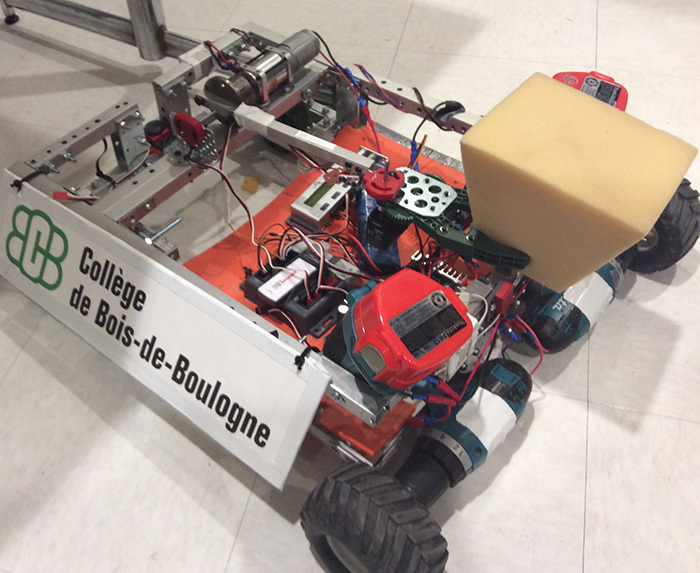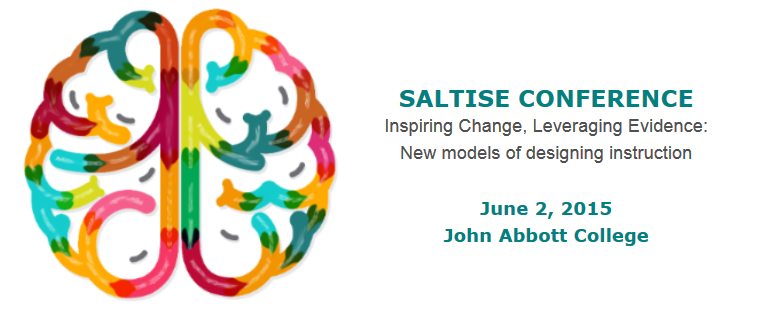Supporting Active Learning and Innovation Across the College Network
Early in March 2015, SALTISE announced its newest cohort of mini-grant recipients. Teachers from a variety of colleges and disciplines are blazing new trails using a variety of strategies and technologies to engage their learners.
Earlier in its existence, SALTISE was geared towards the various Science disciplines, as evidenced by their full name: Supporting Active Learning and Technological Innovation in Science Education. Almost all of the English CEGEPs now have at least one active learning space, and by all reports, they is an increasing demand for these spaces coming from Teachers. While the SALTISE community still places a great deal of emphasis on sharing of active learning practices and research, the second part of its name should not be dismissed. There is also much technological innovation, as this year’s mini-grant projects attest.
In the past couple of years, SALTISE has progressively grown to include disciplines other than its traditional Science core membership. This change prompted a proposal for a new name, to reflect a new reality. Thus, SALTISE announced to its membership earlier this month that it has been renamed Supporting Active Learning and Teaching in the Studies of Education.
According to the SALTISE call for projects, announced earlier this year, the aim of its mini-grant program is to support efforts that promote student-centered active learning at the postsecondary level. The grants are awarded to projects that build or sustain on-going groups (or individuals looking to build a group) that are producing activities and technological innovations that promote active learning. It is SALTISE’s wish that the projects will help students to improve their learning through participation in a learning activity or through the use of a learning tool.
A mini-grant selection committee represented by SALTISE members from Dawson, Vanier, and John Abbott College deliberated in the month of February, once the deadline for the submission of projects had passed. In all, 10 projects from various disciplines were awarded mini-grants, surpassing the target of 8 projects that had initially been envisaged. It is worth noting that both English and French colleges and one university-initiated project successfully bidded for a mini-grant. The majority of the Science-generated projects are from Chemistry, but Math, Biology and Physics are also represented. Some unique entries from Exercise Physiology, Information Technology and Special Care Counselling also received a mini-grant this year.
Sampling of some of the selected projects
Cégep André-Laurendeau: Caroline Cormier and Véronique Turcotte (Chemistry)
Project title: Enrichment of a Web-based Educational Video Bank in Chemistry
From the perspective of a flipped General Chemistry classroom, the project team is producing educational videos for certain chemistry concepts such as polarity, intermolecular bonds, change of state and solubility. These videos will be used in the General Chemistry class starting this semester, and the students will be surveyed in order to measure their level of satisfaction with this new pedagogical approach.
Champlain Saint Lambert: Greg De Luca (Special Care Counselling)
Project title: Using a Virtual Environment in Special Care Counselling
Students in a 3D space will complete course assignments using an online avatar. Thus, students are thrown into a job function without knowing which of their classmates is controlling the avatar in front of them. The goal is to discover whether this online tool has merit for immersion and learning as well as to create a virtual presence for Champlain Cont. Ed. and an asynchronous practice space for its students.
Collège de Bois-de-Boulogne: Sonia Gounar (Sciences informatiques et mathématiques)
Project title: Activité de robotique du collège de Bois-de-Boulogne
To facilitate active learning, the Robotics students will be producing self-paced tutorials that will be used as support for learning or even as quick just-in-time training. Robotics activities call on multiple skillsets and disciplines, which make them intense and enriching at the same time. Some of the tutorials that will be produced include: Connecting Electronic Circuits, Programming with RobotC or EasyC, Welding Electronic Components and Creating Web Sites.

A robot built and programmed by the creative minds at Collège Bois-de-Boulogne
Dawson College: Yann Brouillette (Chemistry)
Project title: ChemCurious Chemistry Videos – Part II
Last year, Profweb published a story about the ChemCurious Chemistry Videos. This year a second collection of short chemical experiment videos will be produced to illustrate a series of exhilarating chemical processes, with an emphasis on chemical reagents, reactions and macroscopic observations. This year, Yann Brouillete will take a different approach to engage learners. Each of his ChemCurious YouTube clips will start with a popular scene from a movie, TV show or comic book that will subsequently be put to the test of reality and explained using chemistry. Yann is hoping that those people who view the clips will subsequently become enthusiastic about chemistry.
Coloured Flames: An example of a ChemCurious video produced with a previous SALTISE grant.
Dawson College: Tim Miller (Physical Education and Physical Rehabilitation)
Project title: Increasing Competency Using Tablet Devices Within the Classroom and Activity Spaces
Tim hopes to receive anecdotal feedback on the use of tablet devices within two courses; Anatomy: Myology and Physical Education Ultimate Frisbee. The activities were set in place to determine whether the use of the tablet devices helped the students increase the achievement of the competency of the course.
In the Myology course (Physical Rehabilitation program), four students were selected to use the tablet with two special applications to help them study on their own time. The first application is an anatomy application that allows students to view the human body in 3D, and remove layers of tissues to focus on each system of the body. The second application allows students to film a human subject and his or her movements. They can then analyze the movement and make any corrections needed. The four students are required to record their use of the device and report back during class time to their peers.
The other Myology students are also using tablets in an Active Learning Classroom. Students can connect the device to the interactive whiteboard and use the applications to complete the various tasks designed by the teacher. The project will also use the tablets for a cross-curricular activity for the Myology class and an Ultimate Frisbee Physical Education class. Students from each class will be paired up for a performance analysis activity.
John Abbott College: Marie-Claire Rioux and Roxanne Milette (Biology)
Project title: Use of Dry-erase Boards and Microbial Models for Group Activities
The main goal of this project is to develop activities that will bring each type of microbe to life in the imagination of the students as well as allow them to link microbial structures to disinfection protocols, disease process and treatment options. The Teachers use stuffed-toy microbial models to help students identify whether a microbes is a virus, bacteria, fungi, protozoan, helminth, arachnid or insect. Dry-erase boards are used for team activities where students have to identify the reservoir, method of transmission, portal of entry and preventative measure used in clinics for different diseases. There will also be activities that use magnetized models that allow students to link cell types to their functions. The models would also be used to describe the body’s responses to different types of pathogens.

The 4th Annual SALTISE Conference: Meet the Minds Behind the 2015 Mini-grants
The college network will have an opportunity to meet and discuss with a number of the mini-grant recipients at the 4th Annual SALTISE Conference, which will be taking place at John Abbott College on June 2nd, 2015. This year’s theme is “Inspiring Change, Leveraging Evidence: New Models for Designing Instruction.” The SALTISE community certainly has a proven track record on all three of these fronts. Each of the mini-grant recipients will be leading a session on their projects.
Keep an eye out on Profweb’s event calendar for more information on registration (coming soon) or visit SALTISE’s web site for up-to-the-minute information.

